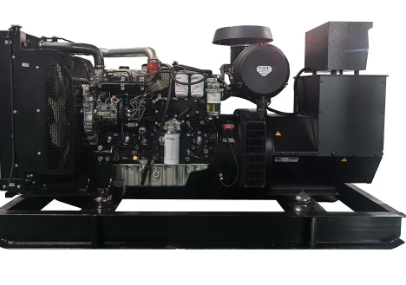Fuel Efficiency and Operational Cost Advantages
Higher Energy Density of Diesel Fuel
Diesel has quite a bit more energy packed into it compared to regular gas, sitting around 35.8 megajoules for every liter. That means when companies run their generators on diesel instead of gasoline, they get more power out of each tank before needing to refill. For operations that need continuous power like construction sites or remote facilities, this makes all the difference. The math works out better too business owners find themselves spending less on fuel overall while still getting what they need from their equipment. Some folks even mention being able to stretch their budget further without sacrificing performance, which is always a good thing in tough economic times.
Reduced Fuel Consumption Per Kilowatt-Hour
When it comes to getting the most out of every drop, diesel generators really stand out. They generally burn about 30% less fuel than gas models when producing the same amount of power. What does this mean practically? Less time spent refilling tanks and lower running costs over time. For companies trying to cut down on energy spending without sacrificing performance, this makes a big difference in their bottom line. The US Department of Energy backs this up too, showing that diesel engines consistently score well on fuel efficiency tests across various commercial settings. No wonder so many businesses stick with them despite the initial investment.
Long-Term Savings Over Gasoline Generators
Looking at their performance over ten years or so, diesel generators actually save businesses a ton on fuel compared to gas models, sometimes saving hundreds of thousands of bucks. Companies going the diesel route get protection against wild swings in fuel pricing too, which cuts down on what they spend to keep operations running smoothly. Maintenance costs are generally cheaper with diesel engines because they don't need service as often or as expensive repairs, something that adds up nicely over time. All these factors point toward why many businesses opt for diesel when looking for dependable power generation that won't break the bank month after month.
Durability and Engine Longevity
Robust Construction for Heavy-Duty Use
Diesel generators have built a reputation for being tough machines capable of surviving rough environments without breaking down. Their durability stems from solid construction using components meant to handle tough situations day after day. That makes them perfect for industries where equipment failure just isn't an option. Manufacturers reinforce this strength with premium metals and engineering techniques that keep these power sources running strong even when faced with harsh weather or constant operation. Construction sites and farms rely heavily on such dependable backup power solutions during outages or peak demand periods.
Superior Performance in Continuous Operation
What really sets diesel generators apart is how well they handle long runs, particularly important places like hospitals and data centers where power can't just flicker out. These machines are built to keep running nonstop for days on end, which means steady electricity even when things get tough during storms or grid failures. For companies dealing with heavy loads all day every day, diesel remains the go-to option because it just doesn't quit when needed most. Look at backup systems across manufacturing plants and emergency services worldwide – diesel keeps showing up again and again simply because it works under pressure better than alternatives. Practical experience shows these generators maintain operation through extreme conditions far more consistently than many other types available today.
3x Lifespan Compared to Petrol Alternatives
When looking at how long they last, diesel engines really stand out compared to their petrol counterparts. Most diesel engines will run for around 25,000 hours before needing major work, while petrol engines generally only make it to about 8,000 hours on average. This means companies don't have to replace their diesel powered machinery as often, which adds up to serious money saved over time. That's why so many manufacturing plants and transport fleets still go with diesel despite higher upfront costs. The extra durability pays off in the long run, especially for operations where downtime is expensive and reliability matters most.
Minimal Maintenance Requirements
One big plus of diesel generators is how little they need in terms of maintenance compared to alternatives. Most diesel engines skip the whole spark plug and carburetor thing entirely, cutting down on all those little parts that usually cause headaches for technicians. Without these extra components, there's naturally less money spent on fixes and fewer days lost waiting for repairs. The simpler design means breakdowns happen far less frequently too. For companies running operations where power outages would be disastrous, this reliability factor makes diesel generators worth considering despite higher upfront costs. Many industrial facilities have found that the long term savings justify the investment.
One thing people often overlook about diesel generators is how much easier they are to cool compared to other options. The cooling systems on these engines just aren't as complicated because diesel runs at lower temperatures than gasoline alternatives. Fewer parts mean fewer things can go wrong, so maintenance becomes something that happens less frequently rather than constantly. Most technicians will tell anyone who asks that this simplicity actually helps engines last longer without losing power over time. Field tests have shown that when operators don't have to worry about coolant leaks or radiator issues, they spend less money fixing problems and more time getting work done. That kind of reliability matters especially during power outages when every minute counts.
Diesel generators tend to need less frequent servicing and generally cost less over time. The larger oil capacity in these engines means companies don't have to stop operations as often for maintenance work, which keeps things running smoothly most of the time. Fewer interruptions mean better productivity when uninterrupted power is critical. Manufacturers report that diesel engines typically go through many more hours before needing an oil change than similar sized gas engines, cutting down on those annoying maintenance bills. All these advantages together explain why so many businesses stick with diesel generators when they need dependable power for extended periods without worrying about constant upkeep.
Operational Reliability in Critical Scenarios
Instant power delivery during outages
When the lights go out, diesel generators kick in almost instantly to keep vital operations running without interruption. This fast response time matters a lot in places like hospitals and banks, where losing even minutes can have serious consequences. Emergency responders often rely on diesel generators as their backup power source since these machines allow work to proceed pretty much normally despite the outage. The fact that they deliver power so quickly makes all the difference for maintaining service continuity when unexpected problems hit the grid.
Stable performance under heavy loads
Diesel generators keep running strong when pushed hard, so there's no risk of sudden power cuts during critical moments. Built tough from the ground up, these machines burn fuel efficiently while still cranking out reliable power, which is why they work so well in tough conditions where other equipment might fail. Field tests across various industries show diesel generators consistently beat competitors when dealing with unpredictable load changes throughout the day. The reliability factor means factories, construction sites, and emergency backup systems can depend on continuous operation without worrying about downtime, something that explains why so many industrial operators stick with diesel despite all the noise and emissions.
Military-grade dependability standards
Military spec diesel generators really hold up when things get tough out there in the field. For companies where power cuts mean disaster, these machines are practically a lifeline. Defense departments have been running them for decades through sandstorms, subzero temps, and pretty much every other nightmare scenario imaginable. When the Army or Navy puts their stamp on something, it means business. These generators don't just last longer than regular models they actually perform better under stress. That's why hospitals, data centers, and construction sites all over the place rely on them when regular electricity goes dark. The military isn't known for wasting money on unreliable gear after all.
Environmental and Safety Considerations
Lower flammability risk vs gasoline
The fact that diesel fuel isn't as volatile as gasoline gives it a real edge when it comes to fire risks in industrial settings. Because diesel doesn't catch fire so easily, workplaces handling other flammable substances can operate with fewer worries about accidental ignition. Looking at actual safety records tells the same story too many factories report far fewer incidents involving diesel equipment versus gasoline powered alternatives. For businesses running heavy machinery or operating in chemical plants where sparks could be disastrous, switching to diesel makes both practical and safety sense.
Modern emission control technologies
Advanced diesel generators have embraced modern emission control technologies, considerably reducing pollutant emissions. These innovations are in line with environmental regulations, promoting cleaner operational practices. According to studies from environmental agencies, there's a clear shift towards cleaner diesel solutions, highlighting their growing role in environmentally conscious strategies.
Tier 4 compliance for reduced pollutants
A growing number of diesel generators on the market today actually comply with Tier 4 emission standards, which means they cut down on those nasty pollutants we all try to avoid. Meeting these environmental rules isn't just about dodging fines from regulators either it helps push forward the whole green energy movement too. According to several recent studies, machines that pass Tier 4 testing emit way less NOx and soot particles compared to older models. This makes a real difference for companies trying to clean up their operations while still relying on backup power solutions during outages or emergencies.
FAQ Section
What are the main benefits of using diesel generators over gasoline generators?
Diesel generators have higher energy density, reduced fuel consumption per kilowatt-hour, and offer long-term savings due to lower fuel and maintenance costs. They are also more durable and have longer operational lifespans.
Why are diesel generators considered more durable than petrol generators?
Diesel generators are constructed with heavy-duty components that withstand demanding environments, offering up to three times the lifespan of petrol engines.
How do diesel generators contribute to environmental sustainability?
Modern diesel generators incorporate emission control technologies and meet Tier 4 standards, significantly reducing harmful emissions and promoting cleaner operational practices.
What makes diesel generators cost-effective in the long run?
Their efficiency in fuel consumption, lower maintenance needs, and extended operational hours without the need for frequent replacements make diesel generators a cost-effective choice.
Are diesel generators safe to use compared to gasoline generators?
Yes, diesel fuel has a lower flammability risk than gasoline, reducing the risk of fires and making diesel generators a safer option in industrial applications.
Table of Contents
- Fuel Efficiency and Operational Cost Advantages
- Durability and Engine Longevity
- Minimal Maintenance Requirements
- Operational Reliability in Critical Scenarios
- Environmental and Safety Considerations
-
FAQ Section
- What are the main benefits of using diesel generators over gasoline generators?
- Why are diesel generators considered more durable than petrol generators?
- How do diesel generators contribute to environmental sustainability?
- What makes diesel generators cost-effective in the long run?
- Are diesel generators safe to use compared to gasoline generators?

